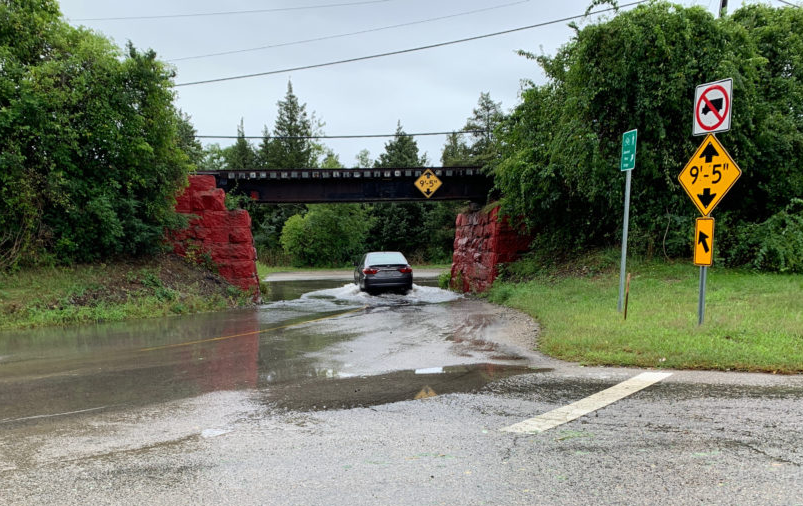Portsmouth Concludes Innovative Resilience Planning Project Prioritizing Needed Infrastructure Improvements
July 19, 2022
Image: Localized flooding at Common Fence Point during Tropical Storm Henri, September 2021. (Jeff Prater/Submitted via MyCoast)
By KYLE GRAY and COURTNEY GREENE/Throwe Environmental
BRISTOL, R.I. — Well aware of the climate-driven stormwater challenges that the community is already facing, the Town of Portsmouth, Rhode Island recently concluded a project that identified and ranked the Town’s greatest resilience infrastructure needs.
Last month, the Town officially wrapped up a yearlong technical assistance project with the Southeast New England Program (SNEP) Network. After responding to the Network’s 2020 Call for Participants request, Portsmouth was awarded free-of-charge assistance to develop a comprehensive and long-term resilience funding and financing strategy. The project built on previous Town planning efforts, including the 2018 Hazard Mitigation Plan Update and the 2019 Summary of Findings from the Rhode Island Infrastructure Bank Municipal Resilience Program’s (MRP) Community Resilience Building Workshop.
“The Summary of Findings from the MRP workshop prioritized challenges and concerns identified by the community to improve our resilience,” explained Town Administrator Richard Rainer. “There was, however, universal recognition that Portsmouth needs to be better prepared for the future through longer-term, community-based, comprehensive resiliency planning. The SNEP Network project started that process for us.”
The project convened a 35-member community workgroup to identify and prioritize resilience hazards, vulnerabilities, and risks. Workgroup members ranged from elected officials to municipal staff and local organizers. The project workgroup leveraged the high level of engagement previously seen in the 2019 MRP Workshop. Participation by the workgroup throughout the process not only raised awareness of climate change impacts and needed infrastructure improvements, but also built consensus on a climate resilience strategy for the Town.
“Public awareness of topics such as these helps to connect the dots between environmental, social, and fiscal wellbeing. A comprehensive understanding of these issues is imperative to guide future planning efforts,” said now retired former Town Planner Gary Crosby.
“It is exciting to see the record of community engagement in resilience planning in Portsmouth. I look forward to building on that momentum moving forward,” commented Crosby’s successor, Town Planner Lea Hitchen.
Monthly workgroup meetings provided a forum to develop and refine a portfolio of resilience-focused capital improvement projects. In close collaboration with the Town and the workgroup, the Network’s Project Team developed the foundations for a Resilience Capital Improvement Program (RCIP). An RCIP adds a resilience-focused lens to a traditional capital improvement program, which typically identifies and prioritizes on-the-ground municipal infrastructure projects. It allows Town staff to pinpoint projects based on their ability to achieve traditional capital and resilience goals. This process also emphasizes efficiency and lowers overall costs. The Project Team developed Portsmouth’s RCIP to consist of a prioritized list of capital resilience projects, a supplemental list of programmatic priorities, and associated recommendations to sustain the program into the future.
Leadership development was another core component of the Network’s assistance. In partnership with the Association of Climate Change Officers (ACCO), the Network offered free scholarships to Portsmouth leaders to become certified as Climate Change Professionals (CC-P®). The SNEP Project Team also connected Portsmouth with the monthly “Soak Up the Rain” webinar series offered by the Environmental Protection Agency, Region 1. Portsmouth leaders headlined an August 2021 webinar in which the Town’s resilience planning efforts were showcased to a national audience.
Town Council President Kevin Aguiar noted, “It is encouraging to see communities across Southeastern New England coming together to address environmental challenges head-on. It is even more encouraging to see Portsmouth becoming a leader in that conversation.”
The Project Team was led by core Network partner Throwe Environmental (Bristol) and Network Rhode Island Liaison Elizabeth Scott Consulting (South Kingstown). The Project Team led Portsmouth through various planning exercises and financing discussions using Throwe Environmental’s Planning to Action: Climate Toolkit (PACT). PACT is a planning tool adapted from the US Climate Toolkit that guides communities through various resilience planning processes, with the intention of catalyzing action and long-term project implementation.
The Project Team produced five key recommendations, bundled into a Climate Resilience Planning and Financing Strategy, to further enhance the Town’s resiliency. The suite of recommendations were anchored by a proposal to develop a townwide resilience program, headed by a new resilience director. The Project Team recommended the new position develop and expand upon resilience planning activities to-date, including the RCIP. Such a process should continuously assess and revisit climate hazards, risks, and vulnerabilities in order to develop a pipeline of “shovel-ready” and/or “funding-ready” projects. The Project Team recommended setting up a resilience contingency fund, similar to the Climate Resiliency and Infrastructure Stabilization Fund in Bourne, MA, to support the implementation of future resilience projects through a dedicated pot of funding. Lastly, the Project Team connected Portsmouth with short-term funding opportunities through the Rhode Island Infrastructure Bank with the hopes of securing investment in RCIP-identified priorities.
Rainer commended the project’s focus on both short- and longer-term investments, saying “This project explored opportunities to stretch future funding dollars even further.” Crosby lauded the RCIP, noting its ability to elevate high priority resilience issues, such as flooding concerns in the “extremely vulnerable” Island Park neighborhood.
The Network’s team shared a preliminary summary of findings during a public workshop sponsored by the Town’s planning department on October 7, 2021. The Project Team also presented its final recommendations and proposed next steps to the Portsmouth Town Council on February 14, 2022.
Rainer shared, “Climate change is not a problem to be solved, it is a predicament to be addressed. The SNEP Network’s technical assistance and training helped our planning staff create a roadmap for producing a comprehensive, long-term, town-wide community resiliency strategy.”
The Town of Portsmouth was founded in 1638 in Southeastern Rhode Island. Located on the northern tip of Aquidneck Island, Portsmouth is particularly vulnerable to compounding climate impacts such as sea-level rise, extreme weather events, and coastal and inland flooding.
The Southeast New England Program (SNEP) Network is a  collaborative group of more than fifteen partner organizations that works to empower communities to achieve healthy watersheds, sustainable financing and long-term climate resilience through management of stormwater and restoration projects. A project of the New England Environmental Finance Center, the SNEP Network provides training and assistance to municipalities, organizations, and tribes and is committed to
collaborative group of more than fifteen partner organizations that works to empower communities to achieve healthy watersheds, sustainable financing and long-term climate resilience through management of stormwater and restoration projects. A project of the New England Environmental Finance Center, the SNEP Network provides training and assistance to municipalities, organizations, and tribes and is committed to  building capacity in conjunction with EPA’s Southeast New England Program within EPA Region 1.
building capacity in conjunction with EPA’s Southeast New England Program within EPA Region 1.
The SNEP Network is a project of, and administered by, the New England Environmental Finance Center, University of Southern Maine, UMaine System.
Throwe Environmental, LLC assists federal, state, and local governments; institutions of higher learning; businesses; and nonprofit organizations in finding innovative and effective solutions to a broad array of environmental challenges. Throwe is committed to developing climate resilience, environmental finance, and policy and governance solutions for its public, private, and nonprofit clients.  As a SNEP Network core partner organization, Throwe Environmental focuses on financing, training, and leadership development. Throwe Environmental is based in Bristol, RI and helps communities nationwide address their climate challenges.
As a SNEP Network core partner organization, Throwe Environmental focuses on financing, training, and leadership development. Throwe Environmental is based in Bristol, RI and helps communities nationwide address their climate challenges.
For more information, please contact info@throwe-environmental.com.
This product has been funded wholly or in part by the United States Environmental Protection Agency under Assistance Agreement SE- 00A00655-0 to the recipient. The contents of this document do not necessarily reflect the views and policies of the U.S. Environmental Protection Agency, nor does the U.S. EPA endorse trade names or recommend the use of any products, services or enterprises mentioned in this document.


One thought on “Throwe: Portsmouth Concludes Innovative Resilience Planning Project Prioritizing Needed Infrastructure Improvements”
Comments are closed.